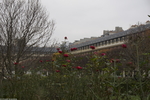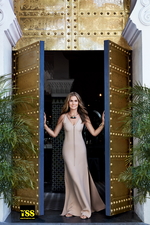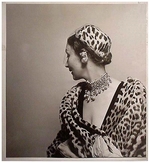WienerBlut Klubwasser (2009): Extinct or Time-Warp Fougere {Perfume Review}
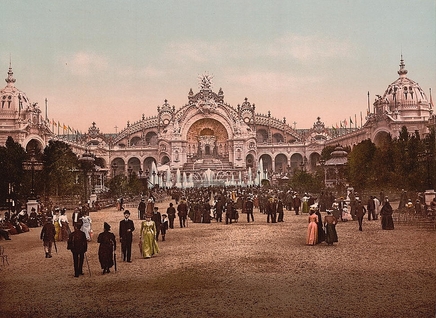
The Exposition Universelle in Paris in 1900
Klubwasser by WienerBlut is said to be an evocation of turn-of-the-century Vienna (see also Q & A with founder Alexander Lauber) but it could be just as well an evocation of a long-forgotten yet familiar scent that once wafted throughout many European cities in that period. It is a nostalgic, old-school -- I am tempted to say even extinct type of fougère -- with a very accentuated coumarin/blond hay facet pushed to an extent that is not seen today. It marks Klubwasser as offering an outmoded and revivalist flavor. The fragrance was composed by Viennese perfumer Yogesh Kumar, a specialist of "emotional communication" as expressed through olfaction.
One is struck here by a frozen-mammoth aspect as if archeologists instead of digging back to light a well-preserved mammoth from the Siberian permafrost or frozen mud complete with the grass and seeds it was eating at the time of death, had uncovered a first-generation fougère in its original state smelling of plants and "fougère" in particular in a much more literalist manner than one might have suspected in the 20th and 21st centuries used to complex constructions around the basic accord. Suddenly one realizes that perhaps the original fougère scent had something of a soliflore showcasing the brand new and exciting blonde-hay note. When perfumer Paul Parquet used the synthetic coumarin for the first time in Fougère Royale by Houbigant introduced in 1882, one could imagine that it smelled very much like the subsequent Klubwasser for this idea of the scent of a fougère royale or Osmunda Regalis L. But Klubwasser is also a reenactment of a "bouquet for the handkerchief" and apart from its insertion in the fougère tradition seems to reproduce as well the aesthetics of olfactory elegance of a time when violet was all the rage, and scents had an even more ephemeral quality due to the use of mostly natural ingredients. The illusion of a photo from the past haloed with poetry is here. The radical historic character is so marked that Klubwasser ends up feeling like a scent from a sci-fi novel...
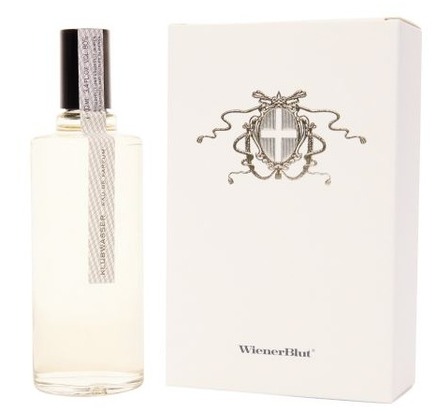
In the opening there is a burst of oakmoss, together with galbanum and pepper, which is a bit surprising to encounter so soon in the top notes as oakmoss at least is typically lodged in a perfume in the base accord. It smells exactly for this note, incidentally, like my old empty bottle of Mitsouko extrait, as I found out by accident in a moment of desultory sniffing.
The discreet lavender and coumarin notes that appear smell like and signal a fougère signature that situates this revivalist scent after the year Fougère Royale was introduced in 1882.
Then, this invigorating beginning resolves itself momentarily into something quieter, a scent a bit resinous, ambery, leathery, sweetish (a nuance of raspberry), angelica-like soft and greenish, powdery too, with a slightly aqueous floral and woody iris impression at the same time resting on less delicate and darker, pulpier, fibrous woods. The woody accord is very macro-photographic in quality. Aromatic herbal overtones linger above the pungent woods that were composed to smell slightly sweaty and animalic thanks to a cumin note. A light, watery oakmoss note is now perceptible.
A nuance hovering between papyrus and hay emerges before settling down for fresh-mown hay with a blonde-colored olfactory overtone making you think of those boxes decorated with shiny golden cut straw. It further feels very much like being in a barn in the summer tucking your nose in the dried hay, catching a whiff of cereals while having uncovered an old trunk full of yellowed papers. The hay accord manages to be very tender and nostalgic thanks to a delicate floral violet note that complements it.
Klubwasser suggests a world where the countryside was beating at the doors of the city with its effluvia of rolled hay blewing on an elegant street on a sunny, windy day as the discreet solar quality of the composition is very much present as in an eternal note of summer. It makes you think that men in particular enjoy the scent of dried herbs as if hay appeared as the blonde, less intoxicating version of tobacco leaves.
The perfume conjures up an era in which a different brand of masculine elegance prevailed, one in which the scent of violet was an indication of pedigree rather than gender. As Klubwasser is low-key and very close to the skin, it also suggests those fragrances made out of natural ingredients, mostly, which would elegantly evaporate following the ideal of the eau de Cologne, leaving only a faint trail on clothes and handkerchiefs.
There is this fleeting aspect to Klubwasser suggesting the ephemeral character of natural essences, which is also what makes it feel authentic and is essential to its outmoded, rustic-urbane charm. But more than that reconstituted-history aspect, there is a genuine poignant quality to Klubwasser as if the perfume had been made to express impermanence itself. It is as if one saw gentlemen in bowler hats hurrying on the sidewalks of a city strewn with hay one moment, resounding of the noise of muddy horse carriages, and the next, the same cleared street as if the wind had swept the last remnants of their lives.
Despite its unisex labeling, Klubwasser feels very much like an old-fashioned water for gentlemen in its main development stages with the shy floral nuances that would have been felt to be appropriate in that end or turn of century. The drydown, which takes on a toned-down oriental feel, feels more feminine however after a while, at that point where it starts becoming more seductive and mysterious evolving from distinguished, elegant and dandy-like a scent to a perfume having succeed in capturing a fragment of the Eternal Feminine in it. What does it smell like? Sensuality and mystery.
The long, long drydown smells of powdery iris, cistus and ambrette seed, and therefore of sensual skin. The lingering notes are very soft, spicy, extremely understated by today's standards except for the barely-there, nude-perfume trend that has arisen recently. But like people who get used to listening to loud music and have become insensitive to subtle sounds, one can accustom oneself again to hushed notes by turning down the volume of our expectations. Soon, our adaptable ears and noses adjust, provided we take the time to listen.







